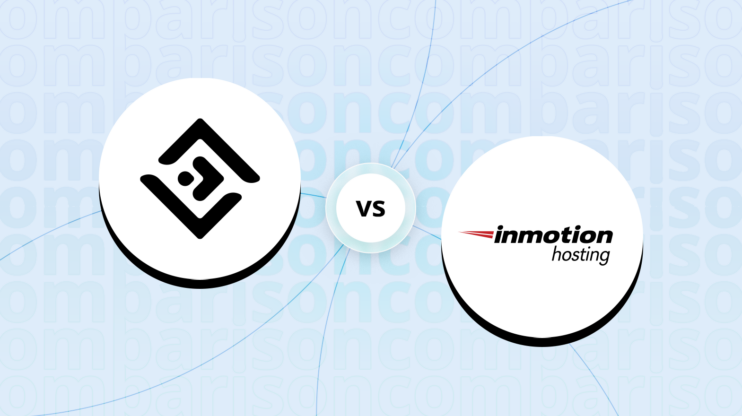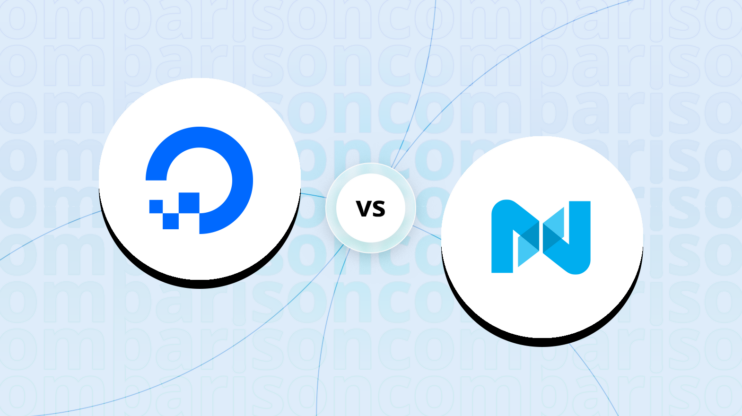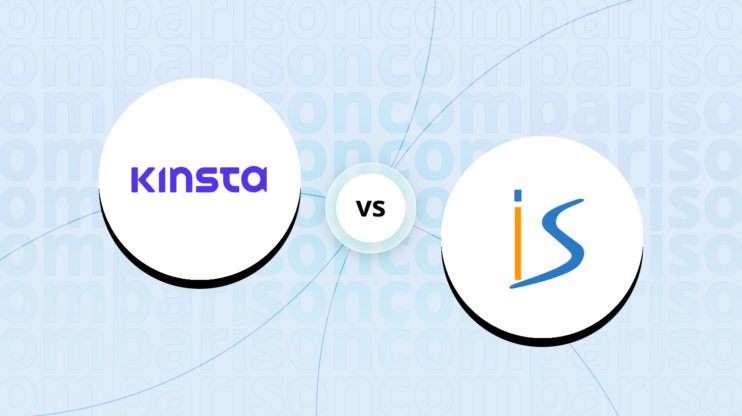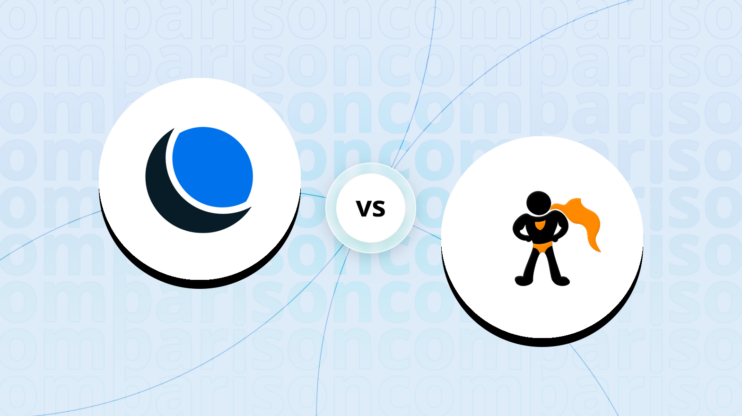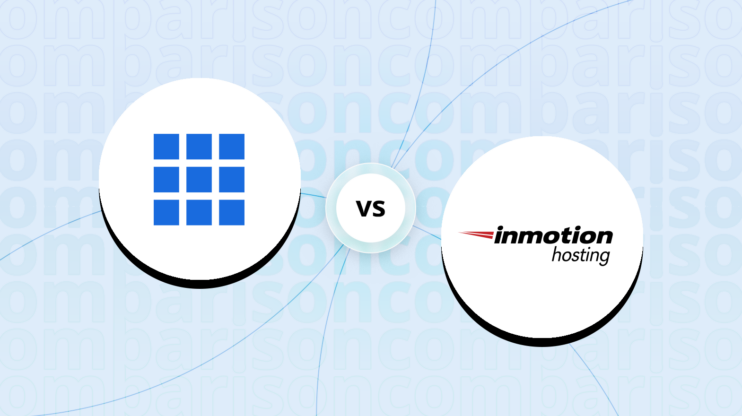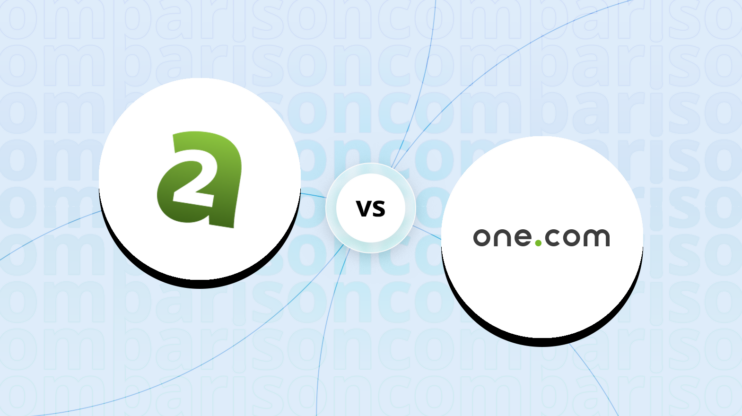Namecheap vs Hostpro: Final verdict
Looking over Namecheap vs. HostPro, both offer distinct advantages depending on specific hosting needs.
Namecheap (Overall grade: 7.2)
offers a comprehensive range of hosting options, including shared, VPS, dedicated, and reseller hosting plans. It excels in providing robust uptime with an average of 99.96%, making it a reliable choice for users. The inclusion of an integrated website builder, free for the first year SSL certificates, and migration services simplifies the setup and transition process for beginners. While Namecheap is ideal for agencies, high-traffic websites, and multimedia content due to its unmetered bandwidth and reliable uptime, it lacks in certain advanced features and manual scaling options. Customer support is a strong point, offering 24/7 live chat and an extensive knowledge base, ensuring users have access to both immediate and in-depth help.
HostPro (Overall grade: 6.9)
stands out with its advanced hardware such as NVMe SSDs, ensuring superior performance with rapid page load times. Its collaboration with premium platforms like DigitalOcean and Vultr, along with 24/7 real-time monitoring, adds layers of reliability. This makes HostPro particularly suited for users needing robust performance and scalability offered by its cloud and VPS hosting plans. Although its uptime of 99.43% due to downtime incidents falls short of the industry standard, the use of NVMe SSDs and LiteSpeed Web Server enhances speed and efficiency. Customer support via email and tickets is available around the clock, but the absence of live chat might be a drawback for those seeking immediate assistance. Nevertheless, HostPro’s security features and competitive pricing on various plans make it a viable choice for users focused on performance and flexibility.
 Overall grade:7.2 |
 Overall grade:6.9 |
|
|---|---|---|
| Uptime and Availability | 8.0 | 6.8 |
| Hosting Performance | 8.2 | 8.5 |
| Hosting Security | 8.5 | 9.0 |
| Price | 8.7 | 8.8 |
| Hosting Features | 7.5 | 5.5 |
| Ease Of Setup | 8.8 | 8.8 |
| User Management | 0.0 | 0.0 |
| Customer Support | 8.0 | 7.9 |
| User feedback | 4.3/5 | 5/5 |
Hosting types offered
Both platforms provide a variety of hosting types, each designed to meet the different needs of users.
 |
 |
|
|---|---|---|
| Shared hosting | ||
| Cloud hosting | ||
| WordPress hosting | ||
| Ecommerce hosting | ||
| VPS hosting | ||
| Dedicated hosting |
Although both offer a variety of hosting plans tailored to different needs, in
certain cases, one platform may prove to be more suitable.
Detailed comparison
Uptime and availability
Evaluates the average uptime statistics, uptime guarantee and overall availability of the hosting
provider
Score Components:
- Uptime percentage (30%): evaluates the uptime statistics in given period of time
- Uptime guarantee (20%): Assesses if the platform offers an uptime guarantee and
whether the actual uptime matches the promised guarantee. - General performance (25%): Evaluates how fast is the average response time and overall
it’s stability. - Responsiveness (10%): Adaptability to different devices and screen sizes.
- Availability (25%): Reflects the total downtime and number of outages.
 8.0
8.0
 6.8
6.8
🏆 Winner Namecheap: Namecheap offers outstanding uptime guarantees and comprehensive monitoring.

Namecheap stands out due to its impressive uptime guarantees, especially for shared, business, and dedicated server accounts. With perfect scores in some tests and an average uptime of 99.96%, it provides a highly reliable service. Namecheap’s use of monitoring tools like StatusCake and Uptime.com ensures consistent performance checks, and they offer compensation for downtime, showing their commitment to reliability.

HostPro, while claiming a 99.9% uptime, has shown only 99.43% in tests over a month. This drops below the industry standard, impacted by two significant downtime instances. However, it utilizes NVMe solid-state drives and multiple data centers in strategic locations, ensuring fast data transfer and decent website loading speeds. HostPro also collaborates with premium platforms like DigitalOcean and Vultr to boost its service quality.
Which one has better hosting performance?
Score Components:
- Hosting speed (30%): This includes SSD quality, Load times, PageSpeed score ranges,
additional information on website speed, built-in plugins for performance enhancement, available caching
methods, and CPU/RAM options - CDN (20%): Considers whether CDN is available or not, whether it’s free or paid, and
the quality of the CDN service - Available data centers (30%): Evaluates the number of data centers and their locations
globally. - Scalibility (20%): Looks at whether elastic scaling is available, the process required
to scale (manual upgrade vs. automatic scaling), the presence of dedicated servers, and the costs
associated with scaling.
 8.2
8.2
 8.5
8.5
🏆 Winner HostPro: Exceptional performance with NVMe SSDs and high-performing processors.
Comparing the general performance of Namecheap and HostPro reveals that HostPro leverages NVMe SSD drives, offering up to 10 times higher performance compared to traditional SSDs. This technological edge ensures websites hosted on HostPro load significantly faster. In terms of hosting speed, Namecheap offers various SSD-based solutions, but HostPro’s integration with LiteSpeed Web Server and LSCache plugin provides additional performance enhancements. Both hosts offer free CDNs, but HostPro’s 24/7 real-time monitoring and Cloudflare integration add a layer of reliability. Namecheap boasts multiple datacenter locations in the US, UK, and EU, while HostPro’s are concentrated in the Netherlands and the USA.
Website Speed
Website speed is a crucial factor, and HostPro’s NVMe SSD-based hosting delivers rapid page loads within less than a second. Namecheap offers commendable speeds for WordPress hosting with a fully loaded time of 0.7 seconds. However, HostPro’s overall speed performance is further bolstered by the LiteSpeed Cache plugin, which includes built-in PageSpeed optimization, image optimization, and other features. This makes HostPro particularly adept at maintaining fast and efficient web loads.
Scalability
Scalability options make HostPro highly appealing. They provide high frequency compute platforms that handle heavy workloads efficiently and feature elastic scaling. Scaling can be done at various price points depending on the plan, starting at $10 per month for VPS hosting with NVMe drives. Namecheap also offers a range of plans including VPS and reseller options. However, specific details about automatic scaling vs manual upgrades aren’t provided for Namecheap, whereas HostPro allows for a more dynamic scaling approach.
Overall, HostPro’s advanced hardware, real-time monitoring, and versatile scaling options make it a strong choice for those seeking high performance and reliability.
Which one has better security features?
and regulatory requirements
Score Components:
- Technical security measures (40%): This includes encryption, firewalls, DDoS
protection, secure configurations, server monitoring, access control and availability of security addons
(e.g Sitelock security). - Operational security measures (30%): Encompasses data privacy, backups and data
redundancy. - Compliance and certifications (20%): Adherence to legal and regulatory requirements
(e.g., GDPR, HIPAA) and possession of certifications (e.g., ISO 27001, SOC 2). - Business and reliability (10%): Factors in the provider’s reputation, uptime
guarantees, and customer support.
 8.5
8.5
 9.0
9.0
🏆 Winner HostPro: HostPro offers a more comprehensive security package tailored for a seamless, secure experience.
Technical security measures:
Namecheap offers a variety of SSL certificates, including Domain Validation (DV), Organization Validation (OV), and Extended Validation (EV) types, available in different formats such as Single Domain, Wildcard, and Multi-domain SSL. HostPro provides free SSL certificates with automatic renewal and SSL installation, making it easier for users to maintain secure websites. While Namecheap’s security measures include virus scanners, PGP/GPG encryption, and Hotlink Protection, HostPro offers Imunify AV+ for virus protection, firewall management, and DDoS protection, ensuring a robust defense against various attack vectors.
Operational security measures:
Namecheap ensures a high level of operational security through features like Two-Factor Authentication (2FA), domain privacy, and advanced spam protection tools like BoxTrapper and Jellyfish Spam Protection. Daily backups and CodeGuard Backup services also add layers of security. HostPro, however, provides a comprehensive set of features such as daily backups stored for 30 days, vulnerability scanning, custom firewalls, and event log management, which adds to a more automated and robust operational security system.
Compliance and certifications:
Both Namecheap and HostPro comply with GDPR, providing rights such as data access, rectification, and deletion. Namecheap does not explicitly mention PCI compliance in the provided context, while HostPro ensures PCI compliance as part of its offerings. HIPAA compliance is not specified by either provider.
 |
 |
|
|---|---|---|
| SSL certificate | Paid options (DV, OV, EV) | Free (Let’s Encrypt) |
| Additional security features | 2FA, Virus Scanner, Domain Privacy, FastVPN, etc. | Imunify AV+, DDoS protection, Custom Firewalls, etc. |
| PHP versions | PHP 5.X to PHP 8.X | PHP 4.4, 5.1-5.6, 7.0-8.0 |
| GDPR compliance | Yes | Yes |
| HIPAA compliance | Not specified | Not specified |
| PCI compliance | Not specified | Yes |
Hosting features
Score Components:
- Domains (20%): Assesses the availability of a free domain, domain purchase options, and
pricing - Email (15%): Considers if the provider offers full email hosting, or is reselling
third-party service, and if the email is only transactional or not - Website builder (15%): Checks if website builder is available, and it’s user
friendliness and overall the level of customization allowed. - Staging environment (20%): Determines if a staging environment is available, allowing
for testing changes before going live. - FTP & SFTP accounts (10%): Evaluates if and how easily users can access FTP and
SFTP accounts - Git and SSH access (20%): Assess whether Git is integrated into the hosting service and
if SSH access is provided
 7.5
7.5
 5.5
5.5
🏆 Winner Namecheap: Offers a comprehensive range of features with user-friendly options and attractive pricing.
Both Namecheap and HostPro offer a variety of hosting features, but there are key differences that might influence your choice. Namecheap provides an integrated website builder in all its shared hosting plans, simplifying the process for beginners. HostPro doesn’t explicitly mention a built-in website builder, which could mean users may need to integrate third-party solutions, adding complexity for novices. Namecheap also includes free SSL certificates for the first year across its plans, enhancing security at no additional cost, whereas HostPro doesn’t specify free SSL availability. An important distinction is that Namecheap offers free website migration within 24 hours, which is beneficial for users looking to switch providers seamlessly.
Analysing other features, Namecheap’s Stellar Plus and Stellar Business plans stand out with unlimited websites, mailboxes, and databases, appealing to businesses with growing demands. HostPro, on the other hand, boasts advanced technologies like NVMe SSD hosting, Varnish, Memcached, and Redis, which are attractive for users focusing on speed and enhanced caching mechanisms. HostPro also supports a broad spectrum of programming languages and server technologies, offering flexibility to more technical users. Both providers offer 24/7 support and a 30-day money-back guarantee, ensuring support and satisfaction, but Namecheap’s inclusion of cloud storage and dedicated email services might tip the scale for those looking for comprehensive packages.
 |
 |
|
|---|---|---|
Free Domain |
No |
No |
Free SSL |
Yes, for the first year |
No |
Email Hosting |
Yes |
Yes |
Website Builder |
Yes |
No |
Staging Environment |
No |
Yes |
FTP & SFTP Accounts |
Yes |
Yes |
Git and SSH Access |
No |
Yes |
Free Backup |
Yes |
Yes |
Money Back Guarantee |
Yes, 30 days |
Yes, 30 days |
a location.
As a result in rare cases the features mentioned here can differ from the ones you see on their websites.
Both providers support a range of users from beginners to experts with user-friendly website builders and WordPress staging areas. However, in terms of developer tools, both Namecheap and HostPro offer robust options including SSH access, support for multiple programming languages, and Git for version control, thus appealing to developers looking for advanced capabilities.
Email Services:
Namecheap offers extensive email features, including unlimited mailboxes for higher-tier plans and tools like SpamAssassin and BoxTrapper for spam protection, making it suitable for businesses with heavy email usage. It doesn’t support third-party services like Google Workspace. HostPro provides unlimited email accounts and secured webmail interfaces, supporting standard protocols like POP3, IMAP, and SMTP, but like Namecheap, it lacks integrated third-party services. This makes both providers competent for standard email hosting, with Namecheap having a slight edge for advanced spam protection options.
Price
Score Components:
- Plan value (40%): What each pricing tier offers.
- Transparency and clarity (30%): Clearness of pricing structures.
- Flexibility of plans (20%): Range of options to suit different budgets.
- Hidden costs (10%): Additional expenses not included in the plan.
 8.7
8.7
 8.8
8.8
🏆 Winner HostPro:Exceptional plan offerings and competitive pricing.
Evaluating the pricing of plans among various hosting providers can be complex due to their differing pricing and renewal strategies. Additionally, certain plans require annual commitments, which adds to the difficulty of making comparisons. The prices listed are based on monthly commitments; plans requiring annual commitments are indicated. Additionally, although some providers offer identical plans for WordPress and shared hosting, we have created separate tables for each to enhance clarity.
When comparing Namecheap and HostPro, each has distinct strengths. Namecheap offers highly economical shared and reseller hosting plans with a variety of added features like free domain names and SSD storage. HostPro, on the other hand, stands out with its versatile managed web hosting and cloud hosting plans, offering options for cPanel or DirectAdmin and utilizing NVMe SSD for optimal performance. Both providers feature a range of WordPress and VPS hosting solutions, with Namecheap leaning toward comprehensive package deals and HostPro offering scalable resources to cater to different levels of demand.
 |
 |
|---|---|
|
EasyWP Starter$6.88
1 website, 10 GB SSD storage, 50k visitors/month, Free CDN, Free SSL, Easy backups and restores, 99.9% Uptime, Hosted on Namecheap Cloud Value for price:8.5
|
Start Plan$4.95
5 websites, 20 GB NVMe SSD, cPanel, Contract terms: 1, 3, 6, 12, 24, 36 months Value for price:9.0
|
|
EasyWP Turbo$12.88
1 website, 50 GB SSD storage, 200k visitors/month, Free CDN, Free SSL, Easy backups and restores, 99.9% Uptime, Hosted on Namecheap Cloud Value for price:8.7
|
Pro Plan$6.95
15 websites, 30 GB NVMe SSD, cPanel, Contract terms: 1, 3, 6, 12, 24, 36 months Value for price:9.3
|
|
EasyWP Supersonic$19.88
1 website, 100 GB SSD storage, 500k visitors/month, Free CDN, Free SSL, Easy backups and restores, 99.99% Uptime, Hosted on Namecheap Cloud Value for price:8.7
|
Business Plan$7.95
30 websites, 60 GB NVMe SSD, cPanel, Contract terms: 1, 3, 6, 12, 24, 36 months Value for price:9.4
|
 |
 |
|---|---|
|
Stellar$4.48
3 websites, 20 GB SSD, 30 mailboxes, Website Builder, Free domain name (1st year), Free automatic SSL, Free Supersonic CDN, 30-day money-back guarantee Value for price:8.4
|
Simple Plan$3.95
2 websites, 512 MB RAM, 10 GB NVMe SSD, Option for DirectAdmin or cPanel, Contract terms: 1, 3, 6, 12, 24, 36 months Value for price:8.7
|
|
Stellar Plus$6.48
Unlimited websites, Unmetered SSD, Unlimited mailboxes, Website Builder, Free domain name (1st year), Free automatic SSL, Free Supersonic CDN, 30-day money-back guarantee Value for price:8.6
|
Strong Plan$6.95
15 websites, 1024 MB RAM, 20 GB NVMe SSD, Option for DirectAdmin or cPanel, Contract terms: 1, 3, 6, 12, 24, 36 months Value for price:9.1
|
|
Stellar Business$9.48
Unlimited websites, 50 GB SSD, Unlimited mailboxes, AutoBackup & Cloud Storage, Website Builder, Free domain name (1st year), Free automatic SSL, Free Supersonic CDN, 30-day money-back guarantee Value for price:8.7
|
Powerful Plan$7.95
25 websites, 1536 MB RAM, 30 GB NVMe SSD, Option for DirectAdmin or cPanel, Contract terms: 1, 3, 6, 12, 24, 36 months Value for price:9.3
|
 |
 |
|---|---|
| N/A |
1 GB Plan$10.00
1 GB RAM, 1 CPU, 25 GB NVMe SSD, 1 TB Bandwidth Value for price:8.5
|
| N/A |
2 GB Plan$20.00
2 GB RAM, 1 CPU, 50 GB NVMe SSD, 2 TB Bandwidth Value for price:8.7
|
| N/A |
4 GB Plan$40.00
4 GB RAM, 2 CPU, 80 GB NVMe SSD, 4 TB Bandwidth Value for price:8.9
|
| N/A |
8 GB Plan$70.00
8 GB RAM, 4 CPU, 160 GB NVMe SSD, 5 TB Bandwidth Value for price:9.1
|
| N/A |
16 GB Plan$125.00
16 GB RAM, 6 CPU, 320 GB Storage, 6 TB Bandwidth Value for price:9.2
|
| N/A |
32 GB Plan$220.00
32 GB RAM, 8 CPU, 640 GB Storage, 7 TB Bandwidth Value for price:9.4
|
| N/A |
64 GB Plan$395.00
64 GB RAM, 16 CPU, 1280 GB Storage, 9 TB Bandwidth Value for price:9.5
|
Enterprise plans
Namecheap’s dedicated hosting starts at $44.88/month, offering full root access and customizable configurations, suitable for high-traffic websites and complex operations. HostPro excels in offering a wide array of VPS plans starting at $12.00/month, scaling up to $144.00/month with options like up to 48 GB RAM and 24 CPU cores, making it suitable for growing businesses and demanding applications.
Namecheap vs Hostpro: Ease of setup
platform.
Score Components:
- Site migration (25%): Assesses whether the provider offers tools for site migration,
either automated or manual, and whether these services are free or require a fee. - Admin panel usability (35%): Evaluates the type of admin panel provided, such as the
standard cPanel or a custom solution, focusing on its accessibility and user-friendliness for both
technical and non-technical users. - Setup features (20%): Examines the availability and ease of use of various setup
features, including FTP accounts, file managers, email account setup, PHPMyAdmin, and easy CDN
configuration. - Help center quality (20%): Measures the quality and accessibility of the provider’s
help center resources, including articles and tutorials.
 8.8
8.8
 8.8
8.8
🏆 Winner Namecheap: A user-friendly hosting solution with extensive support and easy migration.
Namecheap offers a customized EasyWP dashboard which eliminates the need for cPanel, making it highly accessible for non-technical users. This streamlined interface allows for easy management of website tasks, from domain connection to backups, with tools all in one place. Additionally, Namecheap provides the Softaculous app installer, allowing users to install over 200 different scripts with just a few clicks. This makes it ideal for users looking for an intuitive and hassle-free setup process.

HostPro uses the traditional cPanel for its web hosting services, providing a graphical interface that simplifies complex tasks such as database and email management. This is beneficial for users who are familiar with cPanel and prefer a more hands-on approach. HostPro also includes Softaculous for one-click installations, supporting over 300 applications. While cPanel offers a wide range of features and functions, it might be slightly more overwhelming for less tech-savvy users compared to Namecheap’s EasyWP dashboard.
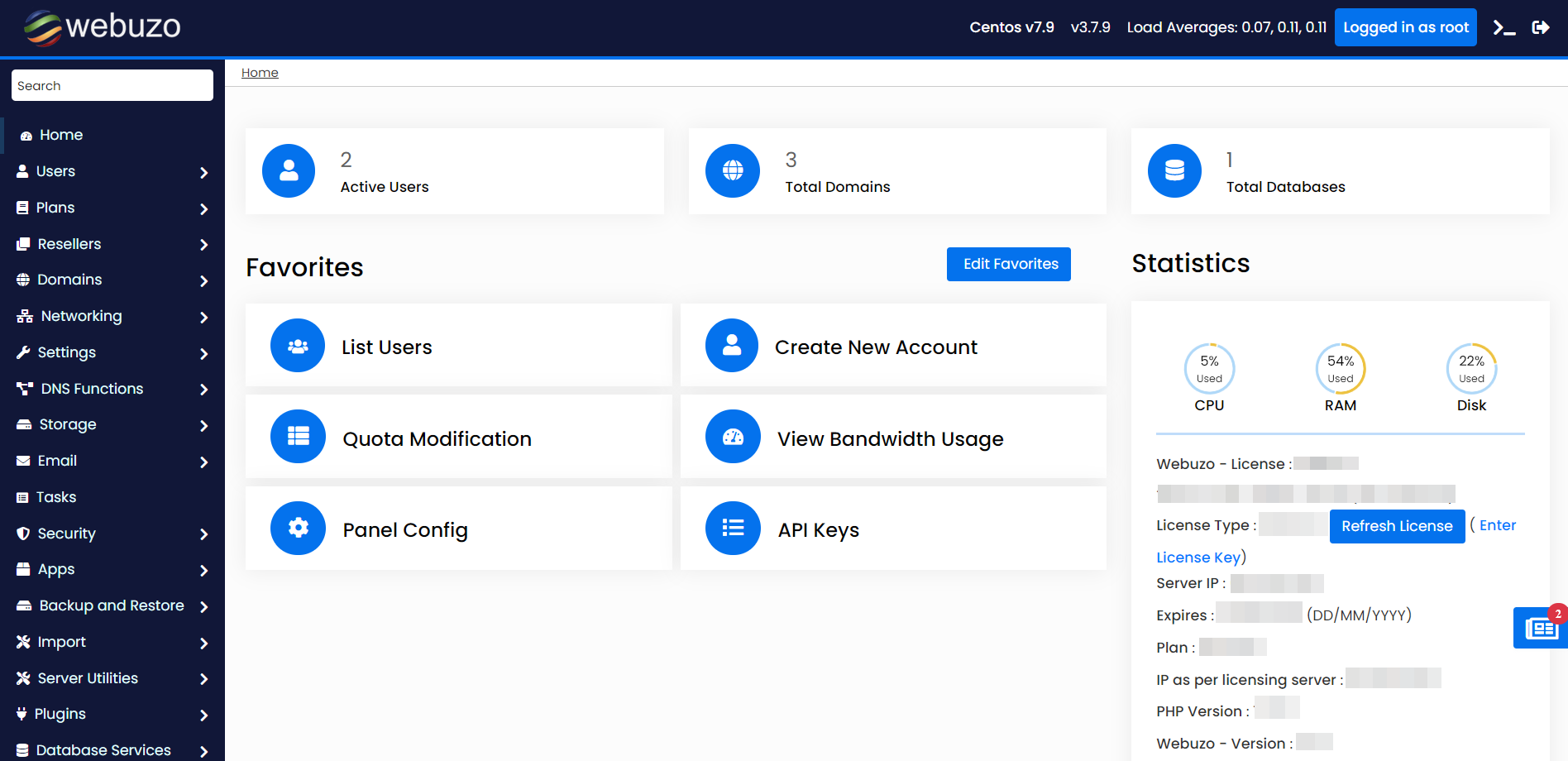
Both Namecheap and HostPro offer free site migration services. Namecheap utilizes the All-in-One WP Migration plugin for seamless migrations from any web host, ensuring a painless transition for users. HostPro offers free manual site migrations, giving a personal touch to the transfer process. Both companies make it simple to switch providers, but Namecheap’s plugin-based automation could be more convenient for users looking for a hands-off migration.
Namecheap provides an extensive Knowledgebase and 24/7 live chat support, making it easy for users to find answers and get assistance at any time. HostPro also offers a comprehensive knowledge base and 24/7 email support, ensuring that users can access the information and help they need. Both providers maintain detailed resources to support their customers, but Namecheap stands out for its instant access to live support.
User management
accessibility.
Score Components:
- Role customization (40%): Flexibility in creating and defining user roles and
permissions. - Ease of management (30%): User interface and tools for managing users.
- Access control (20%): Effectiveness of access control measures for different user
levels. - Scalability (10%): Ability to manage a growing number of users efficiently.
 0.0
0.0
 0
0
🏆 Winner HostPro: HostPro offers comprehensive user management features, ensuring efficient handling of user roles, permissions, and accessibility.
Regarding user management and user roles, both Namecheap and HostPro provide tools to configure and control user roles and permissions. While specific details for both providers are unavailable, it’s crucial to consider the implementation of these features in terms of flexibility. Typically, successful user role management includes ease in creating, modifying, and removing roles, assigning permissions granularly, and ensuring that proper access levels are granted to various users within the system. In this aspect, HostPro is deemed superior based on its score, suggesting a more efficient or user-friendly approach to managing user roles and permissions compared to Namecheap.
Examining the user interfaces and tools provided, both hosting platforms aim to facilitate user management tasks. While detailed UI descriptions are not provided, essential aspects to consider include the intuitiveness of the interface, ease of navigation, and the availability of automation tools to streamline user management. Assuming HostPro’s higher score reflects a more effective interface, users might find it easier to perform administrative tasks, manage accounts, and oversee roles and permissions with minimal hassle. On the other hand, Namecheap might lack certain refined features or ease-of-use elements.
For access control measures and managing a growing number of users efficiently, the effectiveness hinges on the scalability of the user management system and security protocols in place. It is implied that HostPro has a more robust infrastructure for handling increased user volumes and ensuring secure access control practices. This could translate to better performance in larger organizations where multiple users and complex access requirements must be managed seamlessly. Namecheap, by contrast, may face limitations or require more manual intervention as user count scales up.
HostPro user roles table:
| Role | Description | Access highlights |
|---|---|---|
| Administrator | Full control over the hosting account and services. | Can add/remove users, configure settings, access all data. |
| Developer | Limited control focused on development tasks. | Access to development tools, code repository, and databases. |
| Content Manager | Manage content and related resources. | Can add/edit/delete content and manage media files. |
| Support | Handle customer support queries and issues. | Access to support tools, users’ data related to tickets. |
| Viewer | Read-only access for monitoring and reporting purposes. | Can view data and reports but cannot make any changes. |
Customer support
hosting provider.
Score Components:
- Support communication channels (30%): Measures the variety of customer support types
provided (live chat, chatbot, email, phone, etc.) - Availability (20%): Assesses the availability hours for each channel, including 24/7
support options. - Technical support quality (30%): Assesses whether the provider offers comprehensive
technical support, including hardware upgrades (e.g., HDD to SSD), software installations, and web
server configuration changes. - Enterprise support (20%): Checks if there are dedicated or priority support services
for enterprise-level customers.
 8.0
8.0
 7.9
7.9
🏆 Winner
Namecheap provides a more user-friendly customer service experience with extensive support options:
 |
 |
|
|---|---|---|
Phone support |
||
Live chat support |
||
Chatbot |
||
Email/ticket support |
||
Enterprise support (dedicated agent, priority support) |

Namecheap excels in customer service with its 24/7 live chat, extensive Knowledge Base, and a wide array of resources, including how-to videos and guru guides. Their live chat and ticketing system are available around the clock, offering immediate assistance and comprehensive support, while also providing free website migration and instant setup.

HostPro, however, primarily relies on email and text-based support, which are available 24/7 for technical issues. They offer extensive system administration and performance services, as well as a 30-day money-back guarantee and free manual site migrations. Their security and performance services are impressive, but the absence of live chat may be seen as a drawback for those who prefer real-time assistance.
Namecheap vs Hostpro: User feedback
Namecheap is highly appreciated for its affordability, reliable web hosting, and excellent customer support, available 24/7 via live chat. Users commend the inclusion of free SSL certificates and quality cPanel features, making it ideal for beginners and small to medium-sized businesses. However, some dissatisfaction is noted with the shared hosting plans, which are reported to have slow loading speeds and stability issues. Additionally, there are occasional concerns about the complexity of the user interface and the lack of multilingual support.
Users highly recommend HostPro for its excellent balance between performance and price, particularly praising its robust web hosting plans. The VPS service is highlighted for its impressive speed, thanks to blazing-fast SSD and NVMe storage, and powerful processors. The consistently responsive and customer-focused support team receives considerable commendation for their ability to resolve issues promptly. Overall, HostPro stands out for offering a combination of high-quality hardware, scalability, and exceptional customer service.
Namecheap vs Hostpro: FAQ
Which platform is better suited for hosting WordPress websites?
Namecheap offers specialized Managed WordPress Hosting, making it a superior choice for WordPress websites. With plans like EasyWP, it provides easy backups and restores, free CDN, and SSL certificates, ensuring a seamless WordPress hosting experience. HostPro doesn’t offer dedicated WordPress hosting plans, making Namecheap the better option for hosting WordPress sites.
Are both platforms suitable for beginners?
Namecheap and HostPro cater to beginners in different ways. Namecheap provides an integrated website builder and easy-to-use EasyWP dashboard that simplifies setup and management, ideal for non-technical users. HostPro relies on traditional cPanel, which might be more overwhelming for beginners, though it offers extensive documentation and support for those willing to learn.
Which hosting service offers better security features?
Namecheap and HostPro both offer robust security features but differ in approach. Namecheap includes virus scanners, PGP/GPG encryption, 2FA, and domain privacy. HostPro provides Imunify AV+, custom firewalls, and DDoS protection. While both offer comprehensive security, HostPro’s advanced features and automation give it a slight edge in overall security.
Which platform offers better customer support?
Namecheap and HostPro offer solid customer support but with some differences. Namecheap excels with 24/7 live chat, an extensive knowledge base, and guides, providing immediate and comprehensive assistance. HostPro offers 24/7 email and ticket support with extensive system administration services, but the absence of live chat may be a drawback for users needing real-time assistance.
What are the major differences in pricing and value between namecheap and hostpro?
Namecheap offers economical shared and reseller hosting plans with features like free SSL for the first year and an integrated website builder. HostPro stands out with versatile managed web and cloud hosting, featuring NVMe SSD for enhanced performance. While Namecheap provides value for those seeking comprehensive packages, HostPro offers scalable resources catering to a wide range of demands.
Which hosting service offers more scalability options for growing websites?
HostPro provides superior scalability options with high-frequency compute platforms, dynamic scaling, and a range of VPS plans catering to different levels of demand. Namecheap offers VPS and reseller plans, but specific automatic scaling details are less clear. Thus, HostPro’s more dynamic and scalable solutions make it more suitable for growing websites.
The making of this blog
We followed a clear, step-by-step process to write and research this article.









